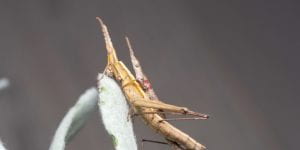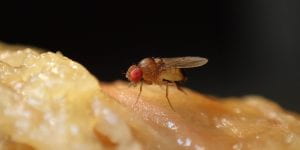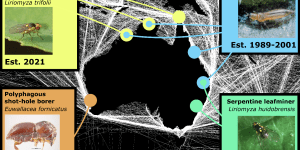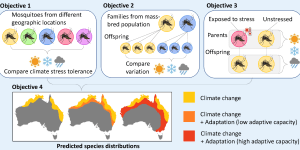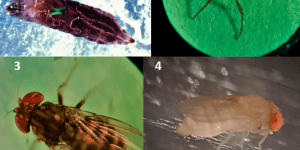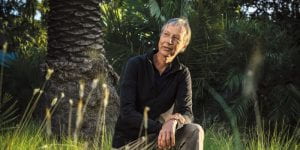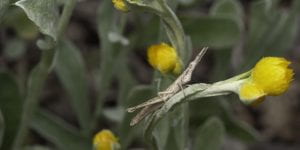Category: Research
-
The breeding trap targeting Melbourne’s growing mozzie problem
Véronique Paris, Liam Ferguson, Nicholas Bell and Ary Hoffmann Banner: Marianne Coquilleau Mosquito-borne diseases like dengue and Japanese encephalitis may feel like far-distant nightmares for many Victorians. Here, the warmer summer months coinciding with the mosquito season are more synonymous with backyard BBQs and backyard cricket than the smell of tropical strength repellents and mosquito […]blogs.unimelb.edu.au/pearg/2024/02/01/the-breeding-trap-targeting-melbournes-growing-mozzie-problem
-
The wingless grasshopper that could cross Bass Strait, but not the Yarra River
Hiromi Yagui, Michael Kearney & Ary Hoffmann Most grasshoppers can fly and some, notably locusts, can travel thousands of kilometres. However, there is a whole family of grasshoppers in Australia that can’t fly at all, and they are not very good at hopping either. These are the morabine (or ‘matchstick’) grasshoppers, comprising around 240 species […] -
The fly DNA fighting killer bacteria
Dr Perran Stott-Ross and Professor Ary Hoffmann Artwork by Tank Monsternova https://www.monsternova.art/ This article was first published on Pursuit. Read the original article. The more we learn about the biological world, the more complex it becomes. Nowhere is this more apparent than in recent discoveries about the ways in which microorganisms influence their hosts. The […]blogs.unimelb.edu.au/pearg/2023/03/29/the-fly-dna-fighting-killer-bacteria
-
Q&A: Victoria’s monster mosquito explosion
By Véronique Paris, Nick Bell and Professor Ary Hoffmann This article was first published on Pursuit. Read the original article. It’s evening and you’re just starting to relax after a hectic day. Just as you do, you hear the unmistakable high whine of a circling mosquito. It’s something most of us are used to in […]blogs.unimelb.edu.au/pearg/2022/11/24/qa-victorias-monster-mosquito-explosion
-
New DECRA projects coming soon! 2/2
Molecular biosecurity: Genomic databanks for managing invasive pests – Tom Schmidt Insect pests frequently establish invasions in Australia or are detected as incursions at borders, but little is often known about where they’ve come from or how best to manage them now they are here. One way to investigate these questions is to sequence and […]blogs.unimelb.edu.au/pearg/2022/09/27/new-decra-projects-coming-soon-2-2
-
New DECRA projects coming soon! 1/2
Predicting the future threat of mosquitoes under climate change – Perran Stott-Ross Mosquitoes are major global pests, transmitting harmful pathogens to humans and livestock and causing significant nuisance biting. Climate change will lead to unprecedented temperature increases in Australia, shifting the habitats that are suitable for mosquitoes. Insects are capable of rapid evolution, but we […]blogs.unimelb.edu.au/pearg/2022/09/27/new-decra-projects-coming-soon-1-2
-
The Scaptodrosophila, an Australian drosophilid genus
Ann J. Stocker Scaptodrosophila are a diverse group of flies whose appearance is very similar to the widespread and widely studied Drosophila. The genus is estimated to have diverged within the drosophilid lineage during the Cretaceous period about 70 million years ago. It was originally considered a subgenus of Drosophila and called Pholadoris in earlier […]blogs.unimelb.edu.au/pearg/2022/05/09/the-scaptodrosophila-an-australian-drosophilid-genus
-
Dengue-blocking mosquitoes here to stay
This article was first published on Pursuit. Read the original article. Dr Perran Stott-Ross Story Producer: Nerissa Hannink Dengue fever and other mosquito-borne diseases remain a massive threat to human health and wellbeing. Urbanisation and climate change are likely to increase this threat as established mosquitoes spread to new environments and gain a foothold. Eradicating […]blogs.unimelb.edu.au/pearg/2022/04/12/dengue-blocking-mosquitoes-here-to-stay
-
A brief word from Ary Hoffmann on genetic rescue in Eastern Barred Bandicoots
Further details herehere -
Mini-beast renaturing: A time for local action
This article was first published on Pursuit. Read the original article. Dr Michael Magrath, Dr Steve Sinclair, Hiromi Yagui, Professor Ary Hoffmann and Professor Michael Kearney Insects in our environment are unsung heroes. These ‘mini-beasts’ are often inconspicuous, but they may have a huge impact on the health of ecosystems that sustain humanity. They pollinate […]blogs.unimelb.edu.au/pearg/2021/11/08/mini-beast-renaturing-a-time-for-local-action
Number of posts found: 71

